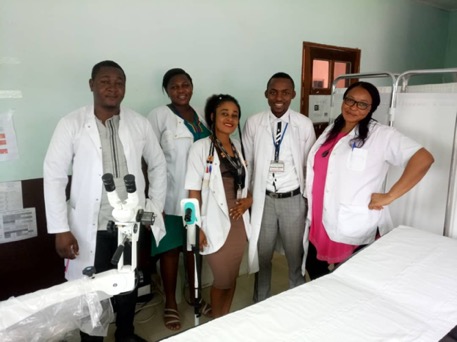Human immunodeficiency virus-infected (HIV[+]) women have a several-fold increased risk of invasive cervical cancer (ICC) as well as increased risk of cervical pre-cancer. In low- and middle income countries (LMICs), ICC is the 1st or 2nd most common cause of cancer and cancer-related death in women. Rates of ICC and ICC-related mortality are particularly high in Sub-Saharan Africa, which also has the highest rates of HIV infection in the world.
Although prophylactic HPV vaccines may be the optimal cervical cancer prevention strategy, 2-3 generations of at-risk HIV[+] and HIV[-] women are already highly exposed to human papilloma virus (HPV) and would not benefit from (and will not be immunized with) HPV vaccine. Thus cervical cancer screening is needed for the foreseeable future. However, Pap testing is expensive and requires a complex clinical and lab infrastructure that does not generally exist in LMICs; strategies based on high-risk HPV (hrHPV) testing or visual inspection after acetic acid (VIA) are promising but are either too non-specific, leading to over-referral for colposcopy or over-treatment, or are too insensitive, respectively. Thus, inexpensive, easily implemented, and effective cervical cancer screening methods are greatly needed in Sub-Saharan Africa, especially for HIV [+] women.
We propose a cervical cancer screening study of 1,200 women (800 HIV [+] and 400 HIV [-] women), aged 25-59 years, living in Cameroon, utilizing our existing research site. We will evaluate screening tests (hrHPV testing, VIA and Pap), traditional triage tests (HPV16/18/45 detection, VIA, Pap), and promising new biomarkers for triage (Ki-C67, TOP2a, CDKN2A, and HPV viral load) of screen positive women. All screen positives will undergo rigorous disease ascertainment to obtain unbiased estimates of sensitivity, specificity, and positive and negative predictive value. This study will establish the foundation and capacity for future studies designed to reduce the burden of HPV-associated cancers in the Cameroon population. It will inform Cameroon and other countries with high HIV burdens on the best strategies for cervical cancer screening in their HIV [+] and HIV [-] women.
The study was implemented in the Limbe Regional Hospital in January 2016 and is ongoing. The implementation began with training of the project team at the Limbe Regional Hospital by trainers both from United States of America and Uganda and coordinated by the Cameroon project team from Yaoundé. Up to date, we have screened 643 women for cervical cancer using VIA and colposcopy technique, done HPV testing for 280 women, done pathology analysis for 74 women and provided pre-cancer treatment using thermocoagulation therapy to 36 women and following up care for 5 women suspicious of cancer. Our intention is to complete care (cervical cancer screening, pre-cancer treatment and referral of cancer cases) for the women all the women that will be enrolled in the study.
Women aged 25-59 years are enrolled in the study. HIV positive women are enrolled in HIV treatment centre while HIV negative women are enrolled at the out-patient department of the Hospital. The key steps in patient enrolment include; obtain of informed consent, administration of enrolment eligibility and demographic questionnaire. Followed by pelvic examination and visual inspection of the cervix with acetic acid (VIA), geneXpert HPV testing of vagina samples, colposcopy and biopsy for HPV and VIA positive women.
The cervical cancer study also has a mandate to reinforce the research capacity of the of young Cameroon researchers. The study has in its scientific productivity plan to have each Cameroonian investigators lead at least one manuscript writing from the data generated and this of course with the full support of the US based researchers. There’s also a strong capacity building component to strengthen the capacity of the Limbe Regional Hospital team to continue doing cervical cancer diagnosis after the study. The study has brought into Cameroon, experts from the USA and Uganda to train the Limbe team on cancer screening and pre-cancer treatment using thermocoagulation therapy.


